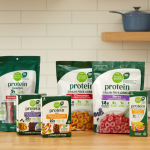NOSH Live Day 2 Recap: Sweet Loren’s Announces New Lower Sugar Product Line; Whole Foods Market Encourages Brands to Stay True to Their Ethos
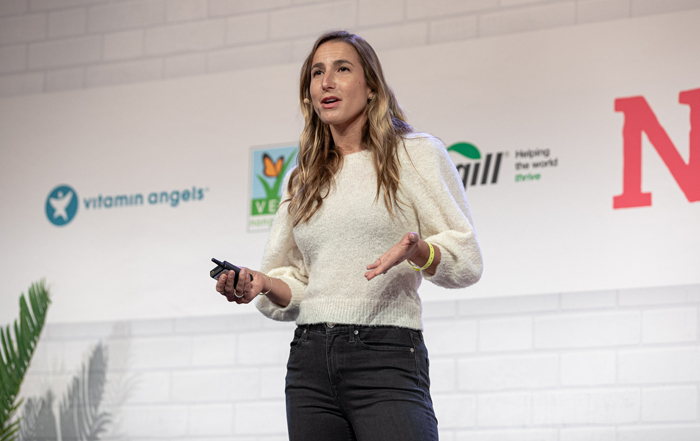
Sweet Loren’s Announces New Lower Sugar Product Portfolio
Sweet Loren’s CEO and founder Loren Castle announced at NOSH Live Summer 2022 on Wednesday that the better-for-you cookie dough brand will be launching a range of reduced sugar products in Publix next month.
Castle began her presentation by taking audience members on a journey through the history of Sweet Loren’s, which has grown from a frozen cookie dough sold at New York City farmer’s markets in 2011 to a multi-SKU brand of refrigerated cookie dough products available at more than 15,000 stores nationwide. Founded in 2011, Sweet Loren’s was born in Castle’s kitchen as she set out to pioneer a health-conscious sweet treat after beating cancer.
“It’s very frustrating when you have a sweet tooth and you want to eat healthy. There really wasn’t a lot in the market, and this was over ten years ago so this was before what the industry is today,” said Castle.
In 2017, the brand replaced the original product with a gluten-free, dairy free, nut-free plant-based portfolio to create a universal product that could be enjoyed by everyone. The current packaging highlights Sweet Loren’s clean, simple ingredients with the large white space in the middle of the wrapper, while incorporating the brand’s signature magenta color at the top.
“We went from being just natural to really everyone in the family can enjoy our product. We’ve seen the rise of lifestyles and food allergies and we really want to create a brand that everyone can eat,” Castle said.
In conversation with NOSH editor Carol Ortenberg, Castle said Sweet Loren’s has remained hyper-focused on the refrigerated cookie dough area of the store to break into the $600 million cookie dough category and establish strong velocities. Rather than inviting distraction by rapidly launching new products outside of the cookie dough category, Castle said the brand will only make the expansion when the time is right.
The release of the lower sugar line comes at a time when consumer shopping trends are seeking out products with low sugar content rather than alternative sweeteners. The new line was heavily influenced by data and consumer feedback, with 48% of customers exhibiting a desire for a lower sugar option with approximately 20% less sugar than current cookie dough offerings.
Sweet Loren’s Lower Sugar products will be available in Publix stores beginning in July and in Stop & Shop stores in August.
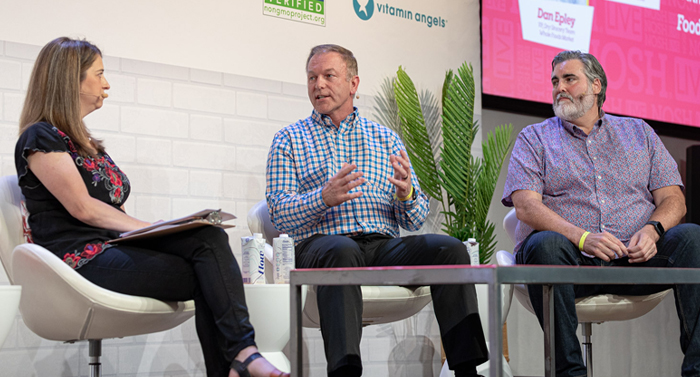
Whole Foods Market Encourages Brands to Stay True to Themselves
While discussing what it takes for a brand to land its product in Whole Foods Market, Dan Epley, VP of the natural retailer’s Dry Grocery Team, and Executive Leader David Lafferty continuously stressed the importance of staying true to their ethos.
Amid the global supply chain crisis and price hikes, Epley and Lafferty said that food makers must remain committed to sourcing quality ingredients. If brands don’t stand for quality, they are letting consumers down, according to Epley.
“Don’t walk away from who you are as a brand,” he said, when asked about potentially substituting ingredients or otherwise cutting corners to keep costs down. If a price increase proves unavoidable, Epley advised brands to be open and transparent about it as data shows shoppers will pay more to eat better.
When considering brands for placements in its stores – whether they are in the early or late stage of development – Whole Foods Market examines sales, potential scalability and social media presence. Is the brand resonating with consumers? Is it creating authentic content? Can it grow regionally or nationally? Depending on what stage the brand is in, Whole Foods may also examine factors like velocity, customer attachment and purchase behavior.
“Our quality standards team is looking at all of the different things that are coming out right now and looking very carefully into the science behind it,” said Lafferty. “A customer expects Whole Foods to really protect them and so we’re being very careful about anything we bring in.”

CPG Consumer Trends By Generation
Innova Market Insights co-founder and global insights director Lu Ann Williams highlighted increased demand among Gen Z for functional, clean-label products focused on sustainability, noting that, in the past year, environmental consciousness surpassed personal health as the predominant global CPG trend.
Plant-based products are rising in demand and falling into the conscious consumption category, with 9% of Gen Z being vegan and 14% being vegetarian. However, two large barriers still stand in the way of creating sustainable growth across generations: taste and price. The plant-based industry could also benefit from new innovations, added Williams, rather than solely focusing on alternative iterations of traditional products like dairy or meat.
“Plant-based still has a long way to go,” said Williams. “It’ll be interesting to see as it starts to develop from just substitutes into something that’s a bit more just the basis of great taste and having the plants center of the plate.”
Also at Day 2 of NOSH Live
- Millenial-led functional chocolate maker Mid-Day Squares discussed the importance of developing social media content to emotionally connect with and grow a loyal fanbase of consumers. According to co-founders Jake Karls, Lezlie Karls and Nick Saltarelli, “attention is the most important asset in today’s world,” and brands will gain consumers’ attention through authenticity and relatability in outwardly displaying both the ups and downs of entrepreneurship.
- Saffron Road founder and CEO Adnan Durrani talked about how to navigate the market during challenging times such as the ongoing pandemic and the current supply chain crisis. Durrani advised brands to practice adaptability by preparing Plan B, C, and D and becoming a missionary rather than a mercenary.
- HumanCo CMO Will Lisman joined Sunrise Strategic Partners managing partner Peter Burns to discuss the key relationship between investor and operator, emphasizing the importance of fostering a connection between the two to align the vision of success. Additionally,
- John Becker, CEO of Pamela’s and Ancient Harvest outline three key components of product management: focusing on the consumer, understanding key metrics of the business to manage complexity and ensuring your product is market ready.



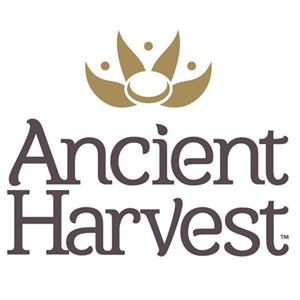

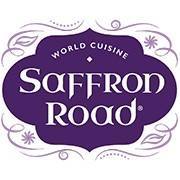
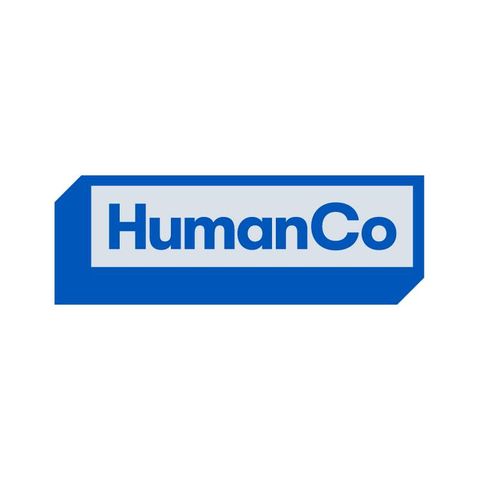


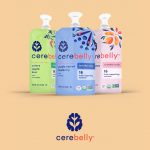











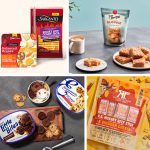
![[Updated] Oats Overnights Secures $45M Investment From Astō](https://d2azl42aua8mom.cloudfront.net/wp-content/uploads/2026/01/29172259/2026-01-29-oats-overnights-secures-45m-in-growth-equity-from-square-150x150.jpg)
